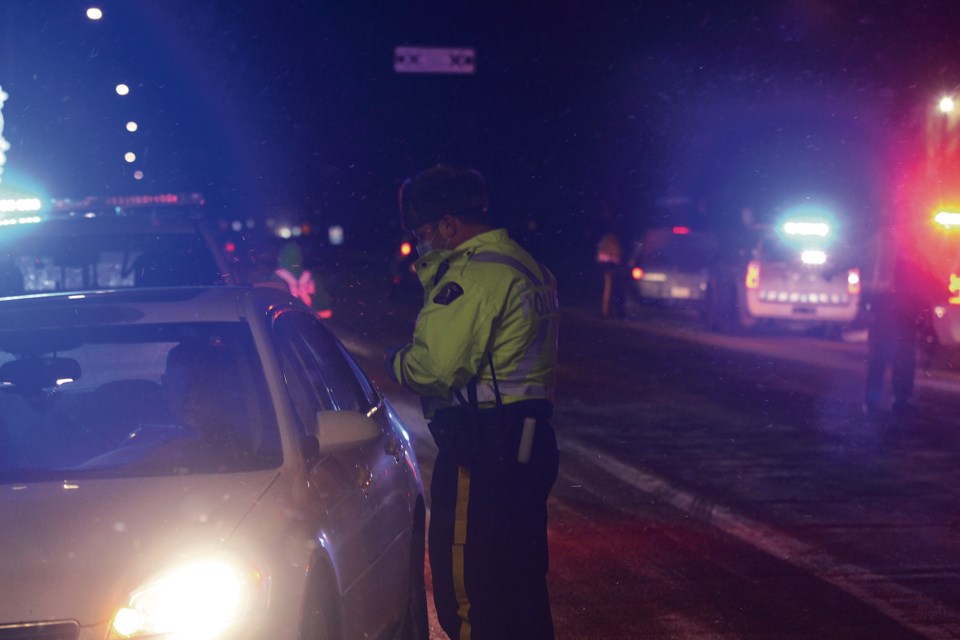WESTLOCK – December is a month of celebration when families and friends come together over the holiday season.
And to ensure everyone gets home safely from their Christmas and New Year’s parties, Westlock RCMP Traffic Services Sgt. Alexander Da Silva has some simple advice — if you plan to drink, or consume cannabis this holiday season, make plans ahead of time and don’t get behind the wheel because your luck will eventually run out.
“It’s not hard to plan ahead and to think things out before you even go out,” said Da Silva, who’s been an RCMP officer for more than 20 years and counts a 30-plus-year career in law enforcement. “Everybody makes mistakes, but this is one you don’t want to make. Can you afford to lose your job if you lose your licence? Or if it does become a Criminal Code case and there’s a collision … from hospital bills, to insurance and legal bills … the costs are crazy.
“And then there’s the ultimate cost, which is the loss of life — you, your family members or someone else’s family member. I look at it this way, if you can afford to go out and drink and have a good time you can afford to pay for a cab ride home.”
The Alberta RCMP promoted sober driving through National Impaired Driving Enforcement Day on Saturday, Dec. 4. As part of the annual, Canada-wide initiative, Alberta RCMP were out in force on provincial highways and conducted checkstops to remove impaired drivers from the road — Westlock RCMP Traffic Services had checkstops that day in both Barrhead and Westlock.
In a follow-up, Alberta RCMP reported Dec. 8 that they removed 91 impaired drivers from the road that day — 47 received Immediate Roadside Sanction (IRS) FAILs and 26 received IRS WARNs. As well, 14 drivers holding GDL licences were issued suspensions and vehicle seizures due to having blood alcohol concentrations greater than zero.
Westlock RCMP Staff Sgt. Al Baird, a 34-year RCMP member, said while there has been progress on combating impaired driving via education and upped enforcement, the problem still exists.
“Typically around this time of the year, maybe because of the education that’s been done, there isn’t a lot of impaired driving, but there’s enough that leads me to believe that many people still aren’t getting the message,” said Baird. “The laws are there, we have the education, yet people still continue to drink and drive.”
Mandatory alcohol screening
Alberta’s impaired driving laws changed Dec. 1, 2020, which included a new Immediate Roadside Sanctions (IRS) program that Da Silva says aims to keeping roads safer by providing serious and immediate consequences for all impaired drivers.
Part of that change included the introduction of mandatory alcohol screening (MAS), which authorizes police officers to request a breath test for blood alcohol concentration from any driver they lawfully stop — RCMP Traffic Services are committed to using MAS in an equitable and non-discriminatory fashion for consideration in every interaction with drivers.
“Now that we’re using (MAS) in a mandatory way, we’re finding more people just below what we can enforce, more 24-hour suspensions and a lot of fails, where we wouldn’t have gotten those before without this program,” said Da Silva.
A roadside breath test indicates the presence of alcohol, while a roadside oral fluid drug screening test indicates the presence of THC, cocaine, or methamphetamine in the driver's saliva. If the tests indicate a pass, the driver continues on their way, while if the test indicates the presence of alcohol and/or drugs, an impaired driving investigation begins.
What follows can include a more-advanced alcohol breath test to determine the blood alcohol concentration (BAC), a standardized field sobriety test (SFST), which checks for signs of impairment by examining the driver's eyes, walking ability, balance and other factors. And if an SFST tests determines impairment, a further evaluation by a drug recognition expert and blood sample may be taken to confirm alcohol and/or drug blood concentration.
If the investigation confirms the driver is impaired by drugs, alcohol or a combination of both, charges can be laid and/or the driver's licence can be suspended.
And sober or not, a driver who refuses to provide a breath sample could be criminally charged, said Da Silva, adding that impairment isn’t just limited to drugs or alcohol.
“It can be fatigue, or even medication. If the warning label says you shouldn’t be operating machinery after use, you shouldn’t be driving,” he said.
Under Alberta’s Traffic Safety Act, the province imposes administrative sanctions for drivers with a blood alcohol concentration (BAC) between .05 per cent (50 milligrams of alcohol in 100 millilitres of blood) and .079 per cent (or 79 milligrams of alcohol in 100 millilitres of blood), which is below the legal threshold associated with the Criminal Code of Canada.
A release from Da Silva notes the risk of a being in a collision increases with a BAC of 0.05 per cent, while the risk of dying in a collision also increases if the driver has been drinking.
“Some people can be impaired even after consuming a small amount of alcohol. It is important that you assess your ability to drive regardless of how much you consume. Impaired driving, regardless of the amount of alcohol consumed, is a criminal offence,” he states.
Da Silva’s release goes on to note that some people believe that using cannabis makes them better drivers, but evidence clearly shows that it impairs their driving ability. These misperceptions can result in driving decisions that put the health and safety of everyone at risk.
“Combining alcohol and cannabis impairs a driver even more than consuming cannabis or alcohol alone. There is a significant combination effect when cannabis is consumed with alcohol. When combined, even at low levels, a greater level of intoxication occurs and the risk of collision increases significantly. Just a small amount of alcohol mixed with cannabis considerably increases the negative effects on driving skills.”



